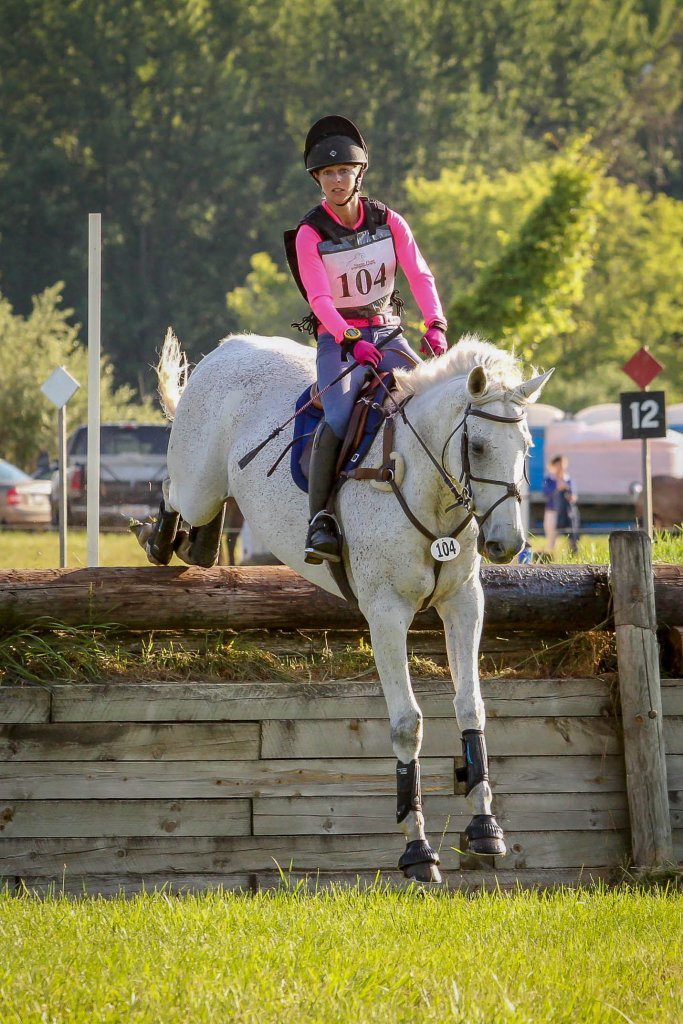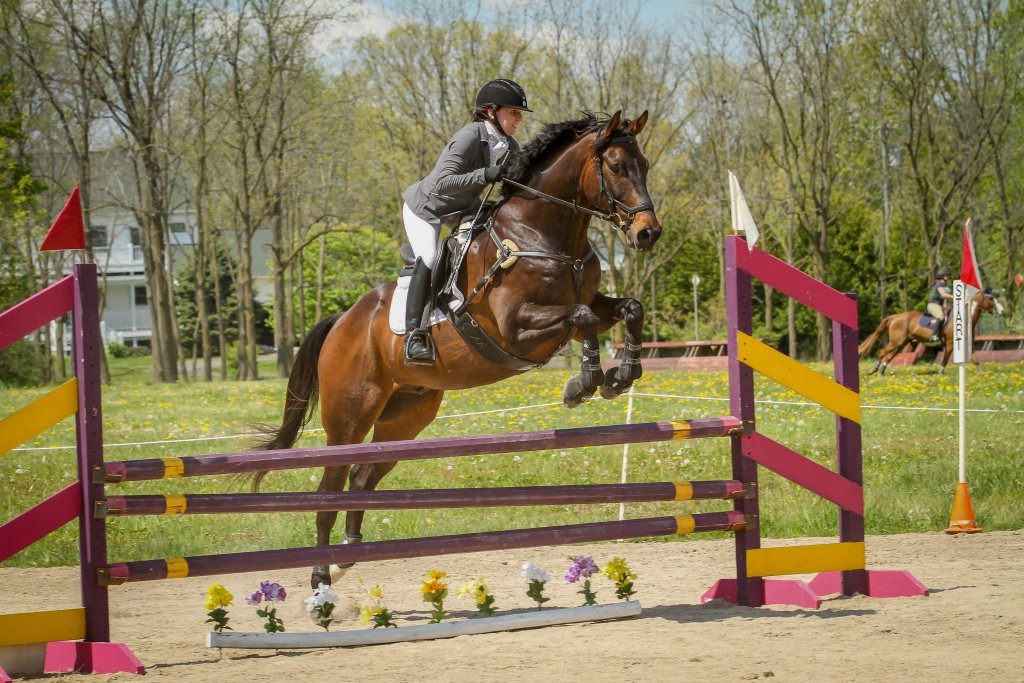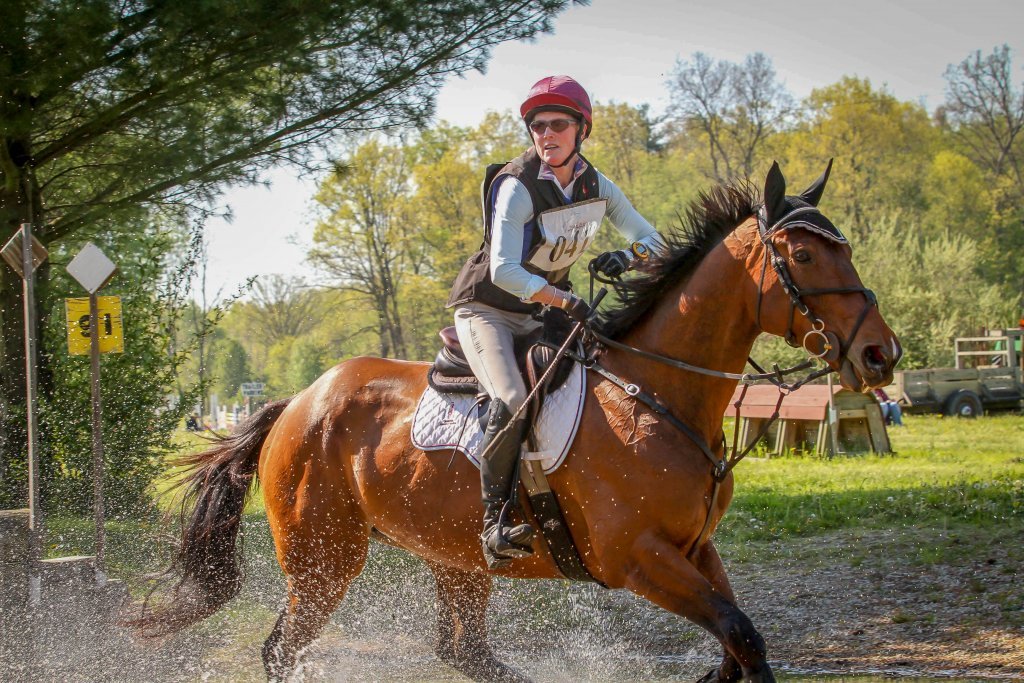USEA Events A-Z: Honey Run Horse Trials

The Honey Run Horse Trials takes place every year at the end of June in Ann Arbor, Michigan (Area VIII) and offers Starter through Preliminary levels.
The Encore Horse Trials first ran in June of 1998 and became the Honey Run Horse Trials in 2016 when Jennifer Merrick-Brooks, who competed at Encore Horse Trials for many years, took over organization of the event from Kathy Arrandale. They retired the Encore Horse Trials name and rechristened the event the Honey Run Horse Trials, named for the Honey Run Equestrian Easement where the event takes place.
Nestled in the suburbs of Ann Arbor, Michigan, the easement is made up of approximately 150 acres of land containing arenas for dressage, a grass area for show jumping, and cross-country courses for Starter all the way up through Preliminary levels. “The neat thing is that this property is in Ann Arbor and many people don’t even know it exists,” explained Merrick-Brooks. “It’s right near Zeeb [Road] and Jackson [Road], which is a fairly developed area. It’s within two miles and people don’t even know it’s there unless they hear about it and come check it out.”
The Eventing Association of Michigan (TEAM) maintains a long-term lease on the easement and is responsible for the maintenance and upkeep of the property. “We pay nothing, but we keep it maintained and managed,” said Merrick-Brooks. “Eric Retford is our course designer and he also lives on one of the properties [that is part of] Honey Run. He has probably built about 98% of our cross-country jumps and most of the stadium jumps that we use.”

Honey Run’s cross-country courses run through three large fields over gently rolling terrain, making for an excellent spectator experience because so many of the jumps are visible. Merrick-Brooks described how the water jump, which is in a central location excellent for spectating, was refurbished a few years ago and has different options for every level. “Even though we’re so close to Ann Arbor, you would never know it,” she said. “There are trees all around the exterior and you can’t see anything major or even hear the highway.”
Retford isn’t the only member of the Honey Run team with a literal stake in the event. Karen Hunchberger’s Debut Farm is part of the Honey Run Easement and Merrick-Brooks described that she has always been willing to jump in and help if need be and as a licensed dressage judge has even stepped in to help judge for a couple hours when necessary. Bridget Rogers, a personal friend of Merrick-Brooks, lives on another portion of the easement and she has assisted many times with technological issues at the events.
One of the challenges the Michigan eventing community faces is that, while they are a tight-knit community, all the events tend to draw from the same volunteer base. Merrick-Brooks, who also organizes the nearby Cobblestone Horse Trials, explained that many of the volunteers who contribute to Cobblestone also volunteer their time at Honey Run, “but there are a lot of resources that I’ve developed over the years from running various events so there are people from all over Michigan that come and help us.” To make recruiting volunteers a bit easier, Merrick-Brooks sends out an email to her volunteer base at the beginning of the year with a list of events so that her volunteers can let her know which events they’ll be able to help with.

Merrick-Brooks also offers mentoring program to foster the next generation of event organizers and provide an opportunity for aspiring organizers to learn about the ins and outs of running an event. “A mentoring program is the only way I think you can get into this without getting overwhelmed as an organizer or secretary or one of the other key players,” she commented.
Honey Run is a smaller event, maxing out at around 165 entries over two days due to parking limitations. Stabling is available off-site at nearby Woodbine Farm and all competitors trailer in on the day of the event, which runs dressage and show jumping on the Saturday and cross-country on Sunday so that the show jumping area can be converted into additional parking space. “That is very much a reason that we don’t run it the traditional way,” Merrick-Brooks elaborated. “We are limited in the numbers we can take, but it’s actually been a good situation. The event has a small community feeling even though we draw from Ohio and Indiana.”

That community is what makes Honey Run such a special event, according to Merrick-Brooks. Everyone from the volunteers to the staff to the competitors themselves chip in and help each other out. “It is a bit of a rare and special thing with the eventing community that’s a little different from the other equestrian disciplines,” she remarked. “There are probably about 25 people that I could call and say, ‘Hey, I’m stuck, can you come and help?’ and that support is pretty special.”
“A lot of [the competitors] are from Michigan and they’re very good as well at stepping in,” she continued. “When they finish riding they’ll help with anything they can. A lot of the professionals in the area are like that as well because we all understand what it takes and they all have a vested interest in keeping it going.”
Even though Honey Run isn’t quite equipped to offer a competitor party, they host an ice cream social on Saturday afternoons as a chance for riders to get together for a bit and socialize. “We wanted to give something that was a little bit different and still fun for the competitors,” Merrick-Brooks said.
At the end of the day, Merrick-Brooks and her team make it a point to keep things friendly and upbeat and make sure that every competitor has a positive experience. “If somebody’s had a horrible ride, I want to keep it as positive as possible and try to go out of our way to make their day somehow.”
The USEA is profiling the history behind all USEA recognized events in the USEA Events A-Z series.















